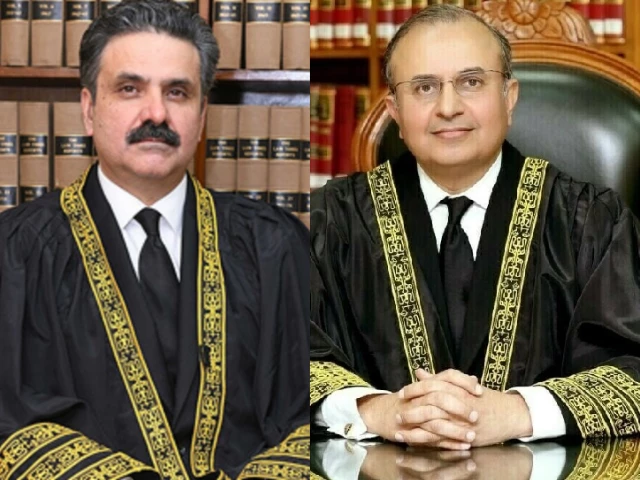Islamabad:
The Supreme Court’s senior Puisne, Judge, Justice Syed Mansoor Ali Shah, has written a letter to Chief Justice Yahya Afridi, and urges him to publicly answer a series of urgent institutional questions at the upcoming Legal Conference on September 8, 2025.
The letter, entitled “Pressing institutional concerns”, spans seven pages, raised serious concerns about transparency, judicial dependence, collegiality and the top of the peak right.
Justice Mansoor emphasizes that the questions he emphasizes are not personal complaints but stems from a “deep commitment to the legal work” and the institution’s integrity. “As a senior-most judge before this court, I write this letter with reluctance, but in discharge for an inevitable institutional duty,” Justice Mansoor wrote.
Justice Mansoor brought up six specific questions for Chief Justice Afridi to answer publicly at the Legal Conference focusing on the unconvention of the Papa Committee, the Audit of the 1980 rules without a full court debate, the issuing of the general state leave, the lack of launching. Independence of the judges.
Among the central questions, Justice Mansoor emphasized that legal guards and bench formations have been issued one -sided and bypassing mandatory consultation.
Justice Mansoor pointed out that his repeated letters and written communication to Chief Justice whether the questions had gone unanswered, adding: “Such silence from Chief Justice to the latest judge of the court is not only discouraged; it undermines the collegial traditions of this court.”
He also criticized the recent revision of the Supreme Court rules, 1980, where he said it was adopted through circulation rather than a full court meeting – an act he considered a “lack of collegiality and preference for unilateral authority.”
Justice Mansoor questioned the policy of requesting disagreement through written communication and called it a “tick-box exercise” that deprived court of Rich Coveration. He also condemned the general standing order (GSO) on leave issued in July 2025, which classifies the judges as “full -time” officials in the state.
“The judges are not regimented officers; their independence is constitutionally rooted,” he said.
He called GSO’s requirements – such as revealing a judge’s residential address and limiting leave categories – as “surveillance” that undermines the dignity and independence of the judiciary.
The most serious prosecution may come in the section of the right to the court itself, where Justice Mansoor questioned why petitions challenged the 26th constitutional change – which affects the judiciary itself – has been unheard of for almost a year.
“Genuine leadership is not in managing compliance, but in ensuring that the court rises over suspicion such as the Fearless Guardian of the Constitution,” he wrote.
The letter marks one of the most open and institutional confrontations in the recent story of Pakistan’s Supreme Court. Its tone, content and the call for public responsibility reflect growing dissatisfaction within the judiciary about the centralization of administrative powers under Chief Justice.
Justice Mansoor ended the letter by encouraging Chief Justice to use the legal conference as “a moment of institutional renewal” and to confirm “the principles of collegiality and constitutional faith.”



